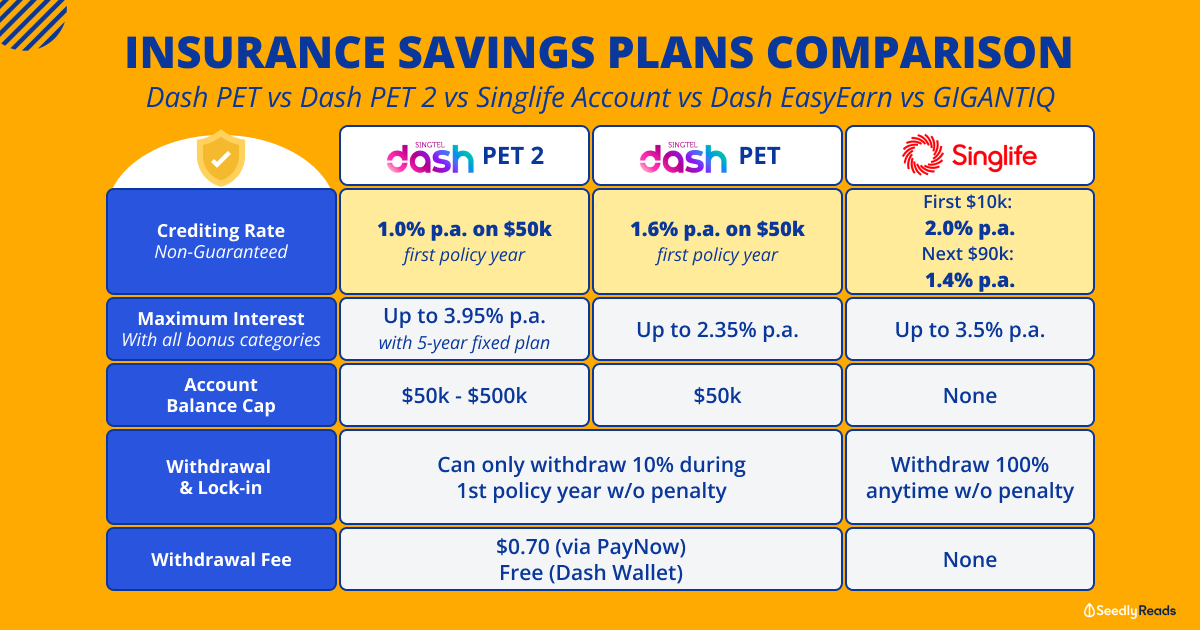Hi anon,
I have to ask first, what are you intending to cover?
At the moment, if you have no dependents or liabilities, then it's not strictly necessary to cover death/TPD. If you do need one, typically you can just go with the cheapest plan as they are quite straightforward.
If you're going to start work soon or already working, then it may be good to look at CI coverage via a limited payment whole life plan with a multiplier. However, it is not so straightforward in terms of the comparison as the plans have different features. For example, they may cover different number of conditions, have added special benefits, etc, that vary from plan to plan. While CI coverage can be obtained via term plans as well, I prefer to keep a modest amount of CI cover in retirement. With a multiplier, I will have boosted coverage while I'm working and still retain my CI cover for my retirement.
Term plans run the risk of ending right when you need the coverage. And it's not just a matter of buy term invest the rest (BTIR), but in BTIR lies a few caveats, namely, you need to take over the role of the insurance company after your term ends. You are not an insurance company. Do you want that responsibility? Because the responsibility of the insurance company, is that no matter what happens, the money's going to be there. Market crash, black swan events, what have you, a $200K policy will result in a $200K claim. A $200K investment portfolio may drop to $150K at the wrong timing. Are you going to sell off at that timing? Or bet on a recovery? What if you are not in the right health to dictate what to do? Or your family members have no idea what your plan was, or have no access to your assets? So many loose ends to think about. Yet the insurers, they do this for hundreds of thousands of people. They manage millions and millions of dollars and they do this with a mindset that is almost perpetual since they do deal with whole life plans, and they have been doing this for years. And they cannot be allowed to fail in their responsibilities to the policy holders. But there is a chance, no matter how small, that you might mess up your investments. Do you have that kind of feeling of responsibility that you can take over the insurer's job by yourself and do you think you can replicate what they do?
And anyway, I don't invest to claim. I invest to enjoy a better quality of life in retirement. Feels counter intuitive to have a giant pot of investments that you cannot touch because 'some day I might need it in the event of CI'.
So go back to what you are intending to insure first. Sure, term does make sense in some situations. But Whole Life cannot be discounted either.







Hi anon,
I have to ask first, what are you intending to cover?
At the moment, if you have no dependents or liabilities, then it's not strictly necessary to cover death/TPD. If you do need one, typically you can just go with the cheapest plan as they are quite straightforward.
If you're going to start work soon or already working, then it may be good to look at CI coverage via a limited payment whole life plan with a multiplier. However, it is not so straightforward in terms of the comparison as the plans have different features. For example, they may cover different number of conditions, have added special benefits, etc, that vary from plan to plan. While CI coverage can be obtained via term plans as well, I prefer to keep a modest amount of CI cover in retirement. With a multiplier, I will have boosted coverage while I'm working and still retain my CI cover for my retirement.
Term plans run the risk of ending right when you need the coverage. And it's not just a matter of buy term invest the rest (BTIR), but in BTIR lies a few caveats, namely, you need to take over the role of the insurance company after your term ends. You are not an insurance company. Do you want that responsibility? Because the responsibility of the insurance company, is that no matter what happens, the money's going to be there. Market crash, black swan events, what have you, a $200K policy will result in a $200K claim. A $200K investment portfolio may drop to $150K at the wrong timing. Are you going to sell off at that timing? Or bet on a recovery? What if you are not in the right health to dictate what to do? Or your family members have no idea what your plan was, or have no access to your assets? So many loose ends to think about. Yet the insurers, they do this for hundreds of thousands of people. They manage millions and millions of dollars and they do this with a mindset that is almost perpetual since they do deal with whole life plans, and they have been doing this for years. And they cannot be allowed to fail in their responsibilities to the policy holders. But there is a chance, no matter how small, that you might mess up your investments. Do you have that kind of feeling of responsibility that you can take over the insurer's job by yourself and do you think you can replicate what they do?
And anyway, I don't invest to claim. I invest to enjoy a better quality of life in retirement. Feels counter intuitive to have a giant pot of investments that you cannot touch because 'some day I might need it in the event of CI'.
So go back to what you are intending to insure first. Sure, term does make sense in some situations. But Whole Life cannot be discounted either.